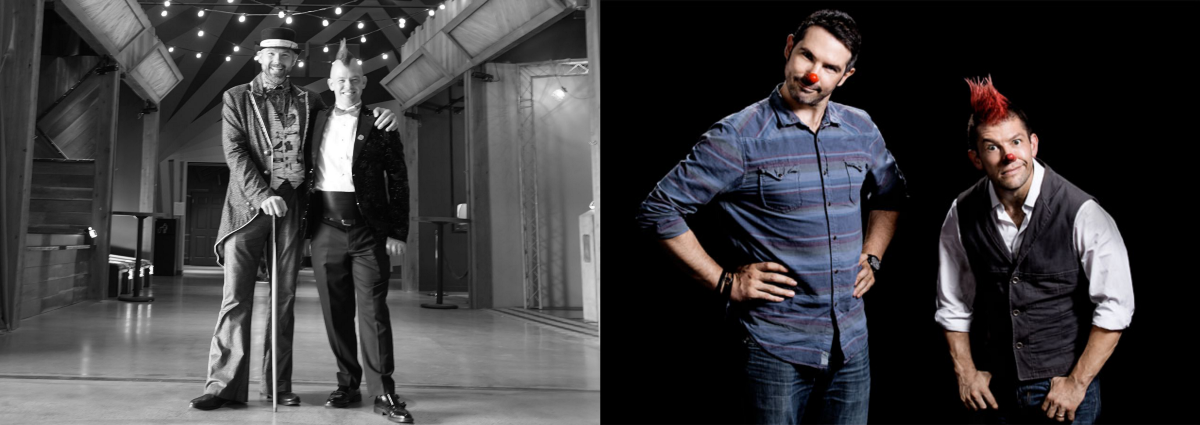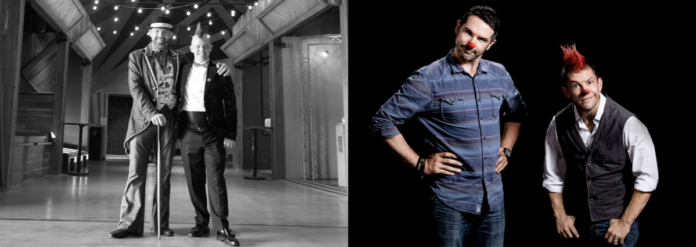Become a mentor. Educators in our schools are overrun because, as a society, we don’t value education nearly as much as other things. There is no substitute for one on one mentorship.
As part of my series about “individuals and organizations making an important social impact,” I had the pleasure of interviewing Brent Bushnell.
Brent Bushnell is the CEO of Two Bit Circus, a Los Angeles-based experiential entertainment company. The interdisciplinary team strives to create immersive, social fun and is currently building a network of micro-amusement parks. Previously they launched STEAM Carnival, a showcase of high-tech entertainment and workshops to inspire invention. They’ve captured action sports content in 3600- video for brands like the NFL, NBA, Indy, and the Olympics for use in VR activations at the Super Bowl, All-Star games and in retail. The company regularly serves as immersive entertainment partners for brands and location-based facilities.
Previously, Brent was the on-camera inventor for the ABC TV show Extreme Makeover: Home Edition. He was a founding member of a creative collective that created stunts for brands like Google and Disney and is responsible for the viral This Too Shall Pass music video for OK Go that garnered 50+ million views on YouTube. Brent is board president of the non-profit Two Bit Circus Foundation which deploys STEAM-based programs to inspire students about invention. In his spare time, Brent enjoys mentoring teens in entrepreneurship, is a supporter of Clowns Without Borders and publishes on Twitter @brentbushnell.
Thank you so much for doing this with us! Can you tell us a story about what brought you to this specific career path?
When I met my co-founder Eric, we immediately connected over the fact that so many people we knew were getting together on Facebook and their phones, but not in real life. So we started building multiplayer, interactive projects on the weekends to lower the barriers of people playing together in public. It was a great time for technology with microcontrollers, sensors, and computer vision all getting so easy to use that we could stitch together a fun experience in a single evening. We started taking our projects to parties and found that people really enjoyed them, so we kept making. Some were terrible, but others had kernels of fun. These public beta tests were invaluable and allowed us to pinpoint what was working and what wasn’t, so we could iterate and improve.
As we continued going to parties and gathering feedback, our projects got bigger and bigger until eventually, brands started commissioning us to build and exhibit at events like the Superbowl, CES, and the Olympics. We even toured around our own carnival, a STEAM Carnival. Fast forward a few years and those projects became the framework for Two Bit Circus and Two Bit Circus Foundation.
When we built our micro-amusement park, we really wanted to incorporate public beta testing and support other creators like us. We hold “Beta Nights” every other month where developers and makers showcase what they’re building and locals can come and get their hands on new, emerging experiences.
Can you share the most interesting story that happened to you since you began leading your company or organization?
Hah! We’ve been doing this for over a decade so that’s a lot of opportunities for stark terror and total elation. One in particular that still makes me laugh involves getting our liquor license for the Micro-Amusement Park. The ABC requires the core owners and their significant others to provide fingerprints and sign that you’re a good person. So we did, and then they came back and said my wife’s fingerprints weren’t clear enough. We tried multiple times until they realized she basically doesn’t have detectable fingerprints and I had to sign an affidavit attesting to her good standing.
Can you share a story about the funniest mistake you made when you were first starting? Can you tell us what lesson you learned from that?
When we first started experimenting, it was still in the very early days for immersive entertainment. Escape rooms didn’t really exist, but some of our first projects looked a lot like escape rooms. We built an entire spy adventure with a lot of technology and multiplayer gameplay but only ran our friends through it because we didn’t see a great economic model yet. So we thought we’d make something more scalable and built a GPS-enabled smartphone game that overlaid an adventure on the real world. But couldn’t get that quite right either. We were on the right track, but escape rooms and Pokemon Go needed to happen before we even knew how to talk about those things!
Can you describe how you or your organization is making a significant social impact?
Robert Putnam in “Bowling Alone” shared research that there is a collapse in civic engagement as people stop spending time together live, in person.
Our goal with Two Bit Circus is to create an environment where everyone can come together and have fun with old friends and new ones. Something we’ve put a lot of focus on is our Park as a Platform Program, which includes the Beta Nights mentioned earlier. For developers, getting a game in front of the public can be challenging so there are great games sitting idly everywhere. We’d aim to help fix that and provide a path for developers to both showcase and monetize their good works.
Two Bit Circus Foundation brings our approach to play and game-making to the k-12 level. We provide kids of all means with access to tools and resources for hands-on STEAM learning. We’ve prevented over 570 tons of usable materials from going into landfills, have introduced over a million students to STEAM disciplines and trained over 5k educators. We recently hosted our annual Anti-Gala at the park, sponsored by Vans, to celebrate STEAM learning.
Can you tell me a story about a particular individual who was impacted by your cause?
I can’t take any credit because he’s so talented, but Caine Monroy is someone who has been a big inspiration to our foundation. He’s someone who started with an idea at a very young age and built it into something that inspired a lot of people
With the cardboard from his dad’s auto parts store that he had in abundance, he was able to build an entire arcade. We try to push that message through in our programs: don’t need fancy equipment. If you’re creative, you can make something amazing with literally found objects. It’s more about imagination and vision for what you want to accomplish than a lot of fancy gizmos.
Caine is now a Jr. Board Member of Two Bit Circus Foundation, and gives us feedback on the programs we run in schools, helping us create opportunities to build programs that inspire creative play for students. His interests have evolved and he is now passionate about the importance of creative play as a gateway to entrepreneurial futures and speaks to students and young people about this whenever possible.
Are there three things the community/society/politicians can do help you address the root of the problem you are trying to solve?
Become a mentor. Educators in our schools are overrun because, as a society, we don’t value education nearly as much as other things. There is no substitute for one on one mentorship.
How do you define “Leadership”? Can you explain what you mean or give an example?
Let me just say, I’m no expert! Leadership is a muscle that takes active management, and ebbs and flows with the state of the rest of your life. For me, leadership is striking a balance between imagination and curiosity, with pragmatism and communication. Good leaders are humble and admit mistakes. Good leaders find collaborators that are better than them at their specific domain and then get out of their way to let them do their work.

What are your “5 things I wish someone told me when I first started” and why. Please share a story or example for each.
- Mistakes are inevitable. Be sure to review your mistakes and utilize that information as you plan your next moves. No battle plan survives engagement with the enemy. Build a plan and then iterate as the information flows in. Failure is only when you give up. We built a variety of entertainment forms really early and while they’re now popular, they weren’t at the time. It was only because we kept iterating that our parks became a reality.
- Keep track of good people. Collaborators are critical for big projects and while you might not need a particular skill set today, note it somewhere like your contact list so that when you do, you know who to call. Kim Schaefer was a game-changing addition to our team. She and I became friends advising the company MagiQuest, then she became a customer of Two Bit Circus when she was at Great Wolf and ultimately joined Two Bit Circus to help make the parks a reality. It was a relationship a decade in the making, not a job search.
- Be transparent with staff as conditions change. We encountered a number of existential threats in building the company, ranging from customers not paying us to running out of money. We made a point of sharing with the team every step of the way, the risks, and realities of our situation so they could best plan their own lives.
- Test and iterate. You will rarely know the right solution to a problem. Instead, you build a possible solution and test it, learn what to change and then test again. Commit to a culture of iteration. We opened our park half-finished and will bring it to version 1.0 only after years of operations. This is sort of like number one but that important!
- Work on mission and values early. We hired 80 people in a single day to help run the parks. As the employee numbers get bigger, it’s harder and harder to personally impart to every employee what it means to be part of the company.
You are a person of enormous influence. If you could inspire a movement that would bring the most amount of good to the most amount of people, what would that be? You never know what your idea can trigger. 🙂
I would love to inspire a movement of mentorship. I believe everyone has something they can teach and yet we have a shortage of mentors.
Can you please give us your favorite “Life Lesson Quote”? Can you share how that was relevant to you in your life?
I love Madeleine L’Engle’s quote “Inspiration usually comes during work, rather than before it.” Two Bit Circus is a great example of this. We didn’t set out to make a micro-amusement park, but after experimenting on a variety of implementations, that was the correct solution. But we never would’ve known if we hadn’t just started doing something.
Is there a person in the world, or in the US whom you would love to have a private breakfast or lunch with, and why? He or she might just see this, especially if we tag them. 🙂
I would love to meet with Bob Iger. I’ve been a lifelong Disney fan and student of that company’s growth. Bob has shepherded an incredible period of Disney’s story.
How can our readers follow you on social media?
Social Media: Twitter: @brentbushnell & @twobitcircus
Instagram: @brentbushnell & @twobitcircus
Website: www.twobitcircus.com


